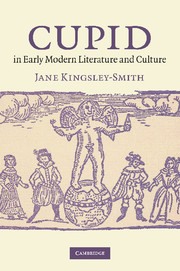Book contents
5 - ‘Cupid and Psyche’: the return of the sacred?
Published online by Cambridge University Press: 10 November 2010
Summary
‘Cupid and Psyche’ is the narrative in which Cupid finally comes of age. He is the morally upright husband of Psyche, the father of Pleasure, and the guide who leads humanity towards knowledge of the divine. Yet such an idea of Cupid is profoundly at odds with the profane and rebellious deity that we have seen troubling early modern England. This final chapter explores the way in which the Neoplatonic reading of ‘Cupid and Psyche’ inherited from Apuleius was baffled in England by the charged eroticism of Cupid. His redemption would depend on Continental and elite influences, requiring a change of performance space and genre from the Elizabethan popular theatre to the Caroline court masque, but ultimately seeming to demand the material absence of Cupid. In this respect, the English appropriation of ‘Cupid and Psyche’ from 1566 to 1635 traces a larger narrative arc: from the most lustrous period of Cupid's fame to his gradual fading-out in the Caroline era.
CUPID AND PSYCHE: APULEIUS, FULGENTIUS AND BOCCACCIO
The union of Cupid (Love) with Psyche (Soul) seems to have been imagined as early as the fifth century bc, when Greek terracotta reliefs used these figures to symbolize the soul's journey after death. A more profane interpretation soon took hold, inspired by ‘the Hellenistic taste for sentimentality and sensuality’, which defined the figures in a more romantic relationship.
- Type
- Chapter
- Information
- Cupid in Early Modern Literature and Culture , pp. 163 - 185Publisher: Cambridge University PressPrint publication year: 2010



